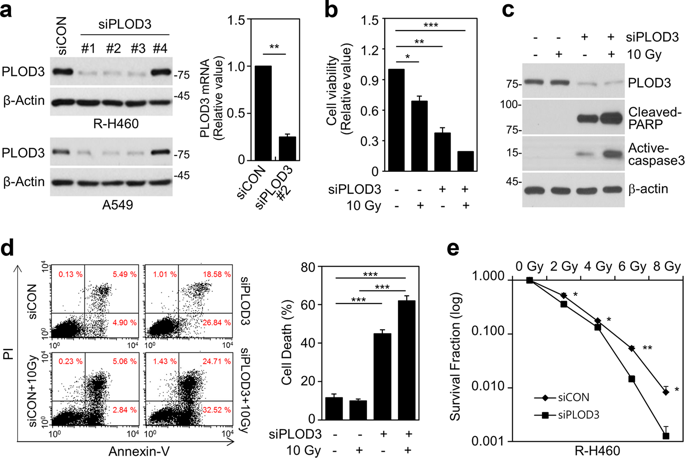当前位置:
X-MOL 学术
›
Cell Death Dis.
›
论文详情
Our official English website, www.x-mol.net, welcomes your
feedback! (Note: you will need to create a separate account there.)
PLOD3 suppression exerts an anti-tumor effect on human lung cancer cells by modulating the PKC-delta signaling pathway.
Cell Death & Disease ( IF 8.1 ) Pub Date : 2019-02-15 , DOI: 10.1038/s41419-019-1405-8 Jeong-Hwa Baek 1, 2 , Hong Shik Yun 1 , Gyoo Taik Kwon 1 , Janet Lee 1 , Ju-Young Kim 1 , Yunhui Jo 1 , Jae-Min Cho 1 , Chang-Woo Lee 2 , Jie-Young Song 1 , Jiyeon Ahn 1 , Jae-Sung Kim 1 , Eun Ho Kim 1 , Sang-Gu Hwang 1
Cell Death & Disease ( IF 8.1 ) Pub Date : 2019-02-15 , DOI: 10.1038/s41419-019-1405-8 Jeong-Hwa Baek 1, 2 , Hong Shik Yun 1 , Gyoo Taik Kwon 1 , Janet Lee 1 , Ju-Young Kim 1 , Yunhui Jo 1 , Jae-Min Cho 1 , Chang-Woo Lee 2 , Jie-Young Song 1 , Jiyeon Ahn 1 , Jae-Sung Kim 1 , Eun Ho Kim 1 , Sang-Gu Hwang 1
Affiliation

|
Current lung cancer treatments are far from satisfactory; thus, finding novel treatment targets is crucial. We recently identified procollagen-lysine, 2-oxoglutarate 5-dioxygenase 3 (PLOD3), which is involved in fibrosis and tissue remodeling as a radioresistance-related protein in lung cancer cells; however, its mechanism is unclear. In this study, we designed human PLOD3-specific short interfering (si)RNAs and tested their effects on tumor growth inhibition in vitro and in vivo. PLOD3 knockdown overcame chemoresistance and decreased radioresistance by inducing caspase-3-dependent apoptosis in lung cancer cells. Furthermore, PLOD3 interacted with PKCδ to activate caspase-2,4-dependent apoptosis through ER-stress-induced IRE1α activation and the downstream unfolded-protein response pathway. In a mouse xenograft model, PLOD3 knockdown promoted radiation-induced tumor growth inhibition, without side effects. Moreover, lung cancer patients with high PLOD3 expression showed poorer prognosis than those with low PLOD3 expression upon radiotherapy, suggesting that PLOD3 promotes tumor growth. Therefore, PLOD3 siRNA suppresses radioresistance and chemoresistance by inducing apoptosis and renders PLOD3 as a candidate lung cancer biomarker. PLOD3 gene therapy might enhance the efficacy of radiotherapy or chemotherapy in lung cancer patients.
中文翻译:

PLOD3抑制通过调节PKC-δ信号通路对人肺癌细胞产生抗肿瘤作用。
当前的肺癌治疗远未令人满意。因此,寻找新的治疗目标至关重要。我们最近鉴定了胶原蛋白赖氨酸,2-氧戊二酸5-双加氧酶3(PLOD3),它与纤维化和组织重塑有关,是肺癌细胞中与放射抗性有关的蛋白质。但是,其机制尚不清楚。在这项研究中,我们设计了人类PLOD3特异性短干扰(si)RNA,并在体外和体内测试了它们对肿瘤生长抑制的影响。PLOD3敲低克服了化学抗药性,并通过诱导肺癌细胞中caspase-3依赖性凋亡而降低了放射抵抗力。此外,PLOD3与PKCδ相互作用,通过内质网应激诱导的IRE1α激活和下游的未折叠蛋白应答途径激活caspase-2,4依赖性细胞凋亡。在小鼠异种移植模型中,PLOD3组合可促进辐射诱导的肿瘤生长抑制,而无副作用。而且,PLOD3表达高的肺癌患者的放疗后预后要差于PLOD3表达低的肺癌,这表明PLOD3促进了肿瘤的生长。因此,PLOD3 siRNA通过诱导细胞凋亡来抑制放射抗性和化学抗性,并使PLOD3成为候选的肺癌生物标志物。PLOD3基因治疗可能会增强肺癌患者的放疗或化疗效果。PLOD3 siRNA通过诱导细胞凋亡来抑制放射抗性和化学抗性,并使PLOD3成为候选的肺癌生物标志物。PLOD3基因治疗可能会增强肺癌患者的放疗或化疗效果。PLOD3 siRNA通过诱导细胞凋亡来抑制放射抗性和化学抗性,并使PLOD3成为候选的肺癌生物标志物。PLOD3基因治疗可能会增强肺癌患者的放疗或化疗效果。
更新日期:2019-02-15
中文翻译:

PLOD3抑制通过调节PKC-δ信号通路对人肺癌细胞产生抗肿瘤作用。
当前的肺癌治疗远未令人满意。因此,寻找新的治疗目标至关重要。我们最近鉴定了胶原蛋白赖氨酸,2-氧戊二酸5-双加氧酶3(PLOD3),它与纤维化和组织重塑有关,是肺癌细胞中与放射抗性有关的蛋白质。但是,其机制尚不清楚。在这项研究中,我们设计了人类PLOD3特异性短干扰(si)RNA,并在体外和体内测试了它们对肿瘤生长抑制的影响。PLOD3敲低克服了化学抗药性,并通过诱导肺癌细胞中caspase-3依赖性凋亡而降低了放射抵抗力。此外,PLOD3与PKCδ相互作用,通过内质网应激诱导的IRE1α激活和下游的未折叠蛋白应答途径激活caspase-2,4依赖性细胞凋亡。在小鼠异种移植模型中,PLOD3组合可促进辐射诱导的肿瘤生长抑制,而无副作用。而且,PLOD3表达高的肺癌患者的放疗后预后要差于PLOD3表达低的肺癌,这表明PLOD3促进了肿瘤的生长。因此,PLOD3 siRNA通过诱导细胞凋亡来抑制放射抗性和化学抗性,并使PLOD3成为候选的肺癌生物标志物。PLOD3基因治疗可能会增强肺癌患者的放疗或化疗效果。PLOD3 siRNA通过诱导细胞凋亡来抑制放射抗性和化学抗性,并使PLOD3成为候选的肺癌生物标志物。PLOD3基因治疗可能会增强肺癌患者的放疗或化疗效果。PLOD3 siRNA通过诱导细胞凋亡来抑制放射抗性和化学抗性,并使PLOD3成为候选的肺癌生物标志物。PLOD3基因治疗可能会增强肺癌患者的放疗或化疗效果。































 京公网安备 11010802027423号
京公网安备 11010802027423号